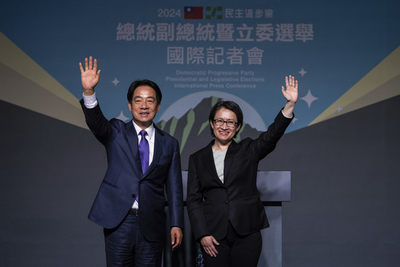
President Joe Biden had a blunt message after voters in Taiwan elected a new president Saturday: "We do not support independence" for Taiwan.
Biden’s words, delivered as he departed for Camp David, reinforced the administration’s position to Taiwan’s new president Lai Ching-te, who has faced strong opposition from China over his calls for independence.
The administration has clarified that while it does not support Taiwanese independence, it favors dialogue between Taipei and Beijing and expects differences to be resolved peacefully and without coercion.
Lai, Taiwan’s vice president who won a third successive term for the Democratic Progressive Party, on Saturday delivered a measured call for “exchanges and cooperation with China” with “dignity and parity.”
Lai’s sense of victory will likely soon be overshadowed by an extended period of uncertainty over Beijing's next move against its neighboring territory. China called the election a choice between war and peace. The U.S. previously warned that China was interfering with the democratically held election.
Secretary of State Antony Blinken congratulated Lai in a post on X, adding that “we also congratulate the Taiwan people for participating in free and fair elections and demonstrating the strength of their democratic system.”
House Speaker Mike Johnson also welcomed the election results, writing in a social media post that “the United States is eager to work with President-elect Lai and build on the strong partnership we’ve enjoyed with President Tsai.”
“To underscore the ongoing commitment of Congress to security and democracy, I will be asking the chairs of the relevant House Committees to lead a delegation to Taipei following Lai’s inauguration in May,” Johnson continued.
Republican lawmakers including Sens. Tom Cotton (R-Ark.), Ted Cruz (R-Texas) and Marsha Blackburn (R-Tenn.) broadly welcomed the development.
Rep. Mike Gallagher (R-Wisc.) and Rep. Raja Krishnamoorthi (D-Ill.), respectively chair and ranking member of the House committee on China, said in a statement that, "During this transition period and into President-elect Lai’s forthcoming term in office, the United States will continue to stand shoulder-to-shoulder with our friends in Taiwan."
Former House Speaker Nancy Pelosi traveled to Taiwan in 2022, the first visit by a high-ranking U.S. official in decades, prompting China to launch days of military drills around the self-governing island.
Two weeks after her trip, Sen. Ed Markey (D-Mass.) led another congressional delegation to Taiwan, and several more have followed since. Lawmakers have made clear that such trips telegraph a firm stance against Chinese aggression in the region.
“The U.S. stands with you and will protect you,” House Foreign Affairs committee chair Rep. Michael McCaul (R-Texas) told Taiwanese officials during a visit in April. That trip was Congress’ largest bipartisan trip to the island since the 1979 passage of the Taiwan Relations Act, a measure that codified the American commitment to support the island’s democracy without direct antagonism of China.
Biden met with Chinese President Xi Jinping in November in an attempt to ease tensions between the two global powers. During the meeting, Xi demanded the U.S. “stop arming Taiwan” and said that its “reunification” with China was “unstoppable,” while Biden reiterated that U.S. policy on Taiwan had not changed.
Phelim Kine and Giselle Ruhiyyih Ewing contributed to this report.